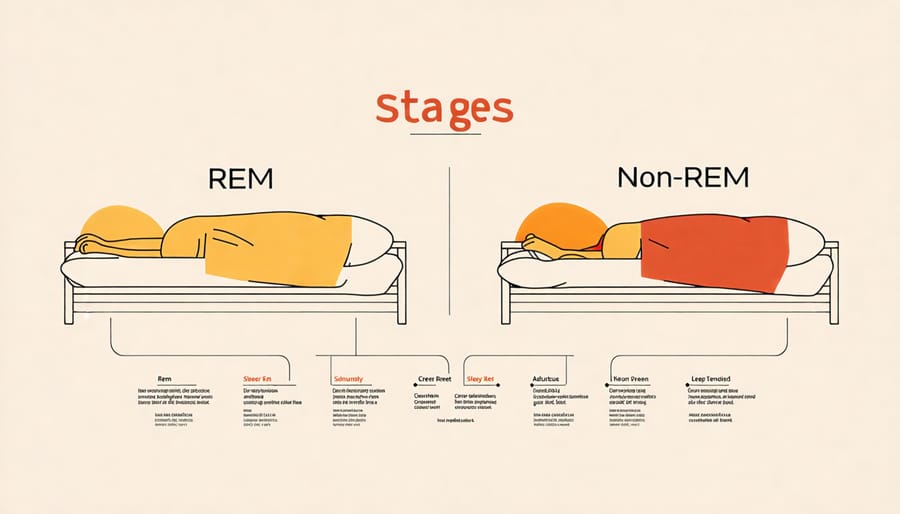Prioritize consistency in your child’s sleep schedule by establishing a regular bedtime routine. Encourage daily physical activity, as it promotes better sleep quality and reduces anxiety. Limit screen time before bed to alleviate sleep disruptions caused by blue light exposure. Foster an open dialogue with educators and healthcare professionals to monitor and support your child’s sleep needs effectively.
Understanding Sleep and Its Phases
The Stages of Sleep
Sleep is a journey through different stages that play crucial roles in restoring our mental health, especially for children. It begins with light sleep, where the body starts to relax and the mind unwinds from the day’s activities. This stage is significant for transitioning to deeper sleep. Next comes deep sleep, a vital phase where the body repairs and regrows tissues, builds bone and muscle, and strengthens the immune system. Deep sleep is key for physical rejuvenation and energy restoration.
The cycle then moves to rapid eye movement (REM) sleep, the stage closely tied to dreaming. During REM, the brain is active and engaged, processing emotions and experiences. This is essential for emotional regulation and memory consolidation, making it crucial for children’s learning and development. Each cycle typically repeats several times a night, ensuring the full benefits of each stage are realized. Adequate sleep is integral to a child’s mental well-being, supporting their emotional balance, focus, and ability to manage stress.

How Sleep Affects the Brain
Sleep plays a vital role in keeping our brains healthy, particularly for children whose minds are still developing. When children sleep, their brains work hard behind the scenes to process information, store memories, and remove waste products that naturally build up during the day. This helps them wake up refreshed and ready to learn. Sleep also supports the brain’s ability to manage emotions, contribute to decision-making, and control impulses, all of which are crucial for a child’s mental health.
Growth hormones are released during deep sleep stages, supporting physical and cognitive development. Not getting enough sleep can disrupt these processes, making children more prone to issues like anxiety or difficulty concentrating in school. Expert opinions suggest maintaining a consistent sleep schedule is essential for fostering an environment that promotes good mental health. Personal stories often reinforce how children thrive with regular, restorative sleep. Understanding these profound connections between sleep and brain health can empower parents, teachers, and healthcare professionals to support children’s well-being.
Sleep’s Role in Emotional Regulation
Link Between Sleep and Mood
Imagine Sarah, a dedicated teacher and mother, who noticed her son becoming increasingly irritable. She learned that his recent slip in sleep was the underlying cause. Sleep deprivation disrupts emotional regulation, making mood swings more frequent and intense. Children may become anxious or seem unusually cranky, overshadowing their once cheerful personality. Just like Sarah’s son, lack of sleep can lead to an emotional rollercoaster, affecting not only their mood but their confidence and well-being. Studies show that a good night’s rest aids in emotional stability, diminishing anxiety and irritability. By fostering better sleep habits, we can help children lead healthier, happier lives. Encouraging bedtime routines like reading or relaxing activities might just be the soothing lullaby they need for emotional balance.
Stress Management Through Sleep
Adequate sleep plays a crucial role in enhancing a child’s ability to manage stress effectively, fostering resilience in the face of everyday challenges. As children sleep, their brains process emotions and consolidate learning, which bolsters mental and emotional fortitude. This natural mechanism equips them with the strength to tackle stressful situations confidently. When children experience restful sleep, they’re more likely to exhibit enhanced emotional resilience, a quality that supports them in navigating social interactions and scholastic pressures with ease. According to experts, a consistent sleep schedule not only aids in regulating emotions but also strengthens the coping mechanisms children rely on. By prioritizing sleep in their routines, parents and caregivers can empower children to approach daily hurdles calmly, ensuring they have the essential rest needed to thrive emotionally and mentally. For more insights into fostering emotional resilience, exploring supportive strategies can be beneficial.

Cognitive Benefits of Sleep for Children
Sleep plays a crucial role in nurturing children’s cognitive development, serving as a foundation for memory, attention, and problem-solving skills. With adequate sleep, children not only perform better academically but also engage more effectively in social interactions. This enhancement of cognitive functions is vital during developmental years when the brain is rapidly growing and forming new connections.
Parents and educators often notice that well-rested children are more attentive in class, retaining new information with greater ease. A compelling real-life example is the story of Emma, a curious six-year-old who, after establishing a regular sleep routine, showed a noticeable improvement in her ability to focus during math lessons, which are typically challenging for her.
Science supports these observations, indicating that sleep consolidates learning by helping the brain process information acquired during the day. Experts like Dr. Amy West, a pediatric sleep specialist, emphasize that restful nights enable children to better categorize and store memories, fostering a deeper understanding of complex concepts.
Moreover, sufficient sleep enhances problem-solving abilities. Well-rested children are more adept at approaching puzzles and real-life challenges with creativity and confidence. Here, supportive habits such as maintaining a healthy relationship with food can positively impact sleep patterns, fueling both the body and mind.
In contrast, chronic sleep deprivation can adversely affect a child’s mood and cognitive capacities, often resulting in irritability and impaired memory. By prioritizing sleep, parents and educators facilitate a supportive environment for cognitive growth, laying a strong foundation for children’s future success.
Consequences of Sleep Deficiency
Short-term Effects
Missing just an hour or two of sleep can make a world of difference in a child’s day. It may not seem significant, but sleep loss quickly affects how kids focus and how they feel. Imagine trying to concentrate in school or during homework time with that constant feeling of tiredness tugging at you. For many children, this lack of sleep turns into a real struggle to pay attention and can even mimic symptoms of conditions like ADHD in the classroom.
Beyond concentration, sleep-deprived kids often experience an uptick in irritability. A child who didn’t get enough sleep might find small challenges overwhelming, resulting in mood swings or outbursts that catch parents and teachers off guard. It’s as if their emotional regulation is off balance, which can lead to frustration for everyone involved. Adequate sleep creates a foundation for children not just to function, but to grow and thrive emotionally and mentally. Providing supportive structures for better sleep can greatly help in brightening a child’s day.

Long-term Mental Health Risks
Chronic sleep deprivation in children can significantly impact their mental health, potentially leading to long-term issues such as anxiety, depression, and even behavioral challenges. When children consistently don’t get enough sleep, their developing brains face added stress, leading to difficulties in processing emotions and managing stress, which are crucial skills for their mental health. According to experts, a lack of restorative sleep affects mood regulation and cognitive function, making children more prone to emotional outbursts and difficulty concentrating. Over time, these challenges can escalate, increasing the risk of more serious mental health conditions.
For parents and teachers, understanding these risks highlights the importance of ensuring children maintain healthy sleep routines. By prioritizing sleep, you can help cultivate a supportive environment that promotes emotional resilience and mental well-being. Encouraging open conversations about sleep habits and ensuring a calming bedtime routine can make a substantial difference in safeguarding a child’s mental health now and in the future.
Tips for Encouraging Healthy Sleep Habits
Creating a Sleep-friendly Environment
Creating a sleep-friendly environment is key to promoting good mental health in children. Start by ensuring the bedroom is cool, comfortable, and dark. Consider using weighted blankets, which can provide a sense of security and improve sleep quality. Encourage a consistent bedtime routine that may include reading or listening to soothing music. Minimize electronic devices before bedtime, as they can interfere with the body’s natural sleep-wake cycle. Having a quiet space is also important, so consider using white noise machines or blackout curtains to block out distracting sounds and light. Creating a routine not only helps children unwind but also establishes a sense of safety and predictability, essential for both mental and physical well-being. Ultimately, these steps can make a big difference in how children experience the world around them.
Establishing Consistent Routines
Creating consistent sleep routines can tremendously benefit children’s mental well-being. Start by setting a fixed bedtime and wake-up time, even on weekends, to help regulate their internal clock. A balanced evening routine can include calming activities like reading or listening to soothing music to signal it’s time to wind down. Limit screen time at least an hour before bed, as the blue light from devices can interfere with sleep. Encourage kids to express their worries and thoughts in a journal if they find it hard to relax at night. Also, making the bedroom environment comfortable — such as using blackout curtains and adjusting room temperature — can enhance the quality of sleep. Establishing these routines with patience and consistency will foster healthy sleep habits essential for mental health.
Conclusion
Recognizing the integral role sleep plays in nurturing a child’s mental well-being is crucial for parents, teachers, and healthcare professionals. Throughout this article, we’ve explored the profound connection between sleep and mental health, emphasizing how quality sleep supports emotional regulation, cognitive function, and overall resilience. Insufficient sleep, on the other hand, can exacerbate stress and anxiety, directly impacting a child’s capacity to engage and learn. By prioritizing and improving children’s sleep habits, we can lay a foundation that fosters healthier, happier, and more balanced lives.
To make a real difference, it’s important to create a sleep-friendly environment and establish consistent bedtime routines. Encourage open conversations about the importance of rest, and consider expert advice when needed. Simple changes can yield significant results, improving both mental health and daily life for children. By working together, we can champion better sleep practices that support our children’s mental and emotional development, helping them thrive today and in the future.







